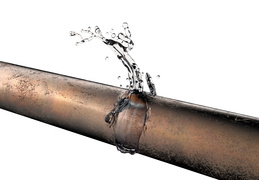Copper piping has long been considered the gold standard for residential plumbing. Many homeowners in the Florida Panhandle and along the Gulf Coast rely on copper for its durability, longevity, and resistance to corrosion—especially when compared to outdated materials like galvanized steel or cast iron. But does that mean copper piping is invincible?
“It’s copper—it can’t corrode, right?” Unfortunately—not entirely true. While copper piping is indeed superior to many older materials, it’s not immune to wear and tear. Over time, even copper can corrode under the right conditions. Understanding why—and knowing what signs to watch for—can help you protect your home’s plumbing for the long haul and understand when you need repiping in Baldwin County.
Why Homeowners Trust Copper Piping
There are many reasons copper became the standard for home plumbing systems. It’s lightweight, resistant to heat, and less prone to leaks than older alternatives like steel or iron. Most importantly, copper resists rust and corrosion better than most metals, making it a smart choice for both hot and cold water lines.
Because of its reputation for lasting 50 years or more, many homeowners believe that once copper piping is installed, it’s a “set-it-and-forget-it” solution. While it does outperform other materials in most cases, that doesn’t mean it lasts forever—especially in homes with water quality issues or aging infrastructure.
The Truth: Copper Can Still Corrode
Despite its many advantages, copper is not corrosion-proof. In fact, copper pipes are susceptible to several types of corrosion, including:
1. Pitting Corrosion
This is the most common form of copper corrosion. It creates small, localized pits or pinholes in the pipe, which can eventually lead to leaks. Pitting corrosion is often caused by aggressive water chemistry, especially water that is high in chlorine or has an unusually low pH.
2. Erosion Corrosion
Erosion corrosion (that has a nice rhythm to it, doesn’t it?) occurs when water moves through the pipes too quickly, wearing away the protective oxide layer that naturally forms on the interior of copper piping. This type of corrosion is more common in systems with high water pressure or poorly designed plumbing layouts.
3. Galvanic Corrosion
When copper pipes come into contact with dissimilar metals like steel or aluminum without proper insulation, galvanic corrosion can occur. This electrochemical reaction leads to accelerated deterioration of the weaker metal and can compromise your plumbing system over time.
Older Homes May Need Partial or Full Repiping
Many homes across the Gulf Coast still rely on original plumbing that’s several decades old. While copper might have replaced steel or galvanized piping during a partial upgrade, not every home was fully repiped. If your home is more than 30–40 years old, it’s time to consider whether repiping—either partial or whole-home—is necessary.
Trust the Peaden Pros for Expert Plumbing Solutions
At Peaden, we take pride in protecting your home’s plumbing and your family’s peace of mind. Whether you need a small section of piping replaced or a full home repipe, our team has the training and tools to get the job done right.
We’ll walk you through your options, explain the benefits of updated plumbing materials, and provide honest recommendations based on your home’s age, water quality, and usage patterns.

